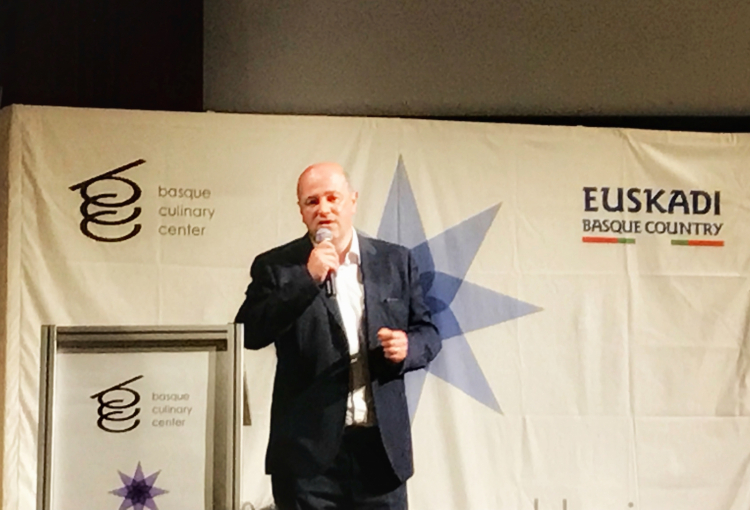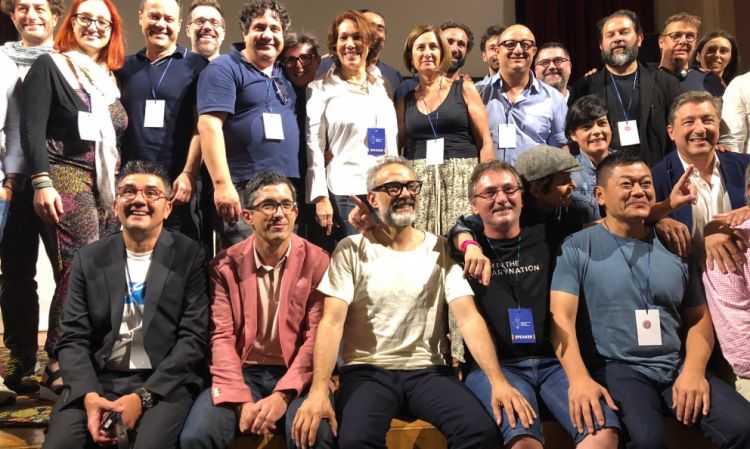Only a few days ago, in Modena, as we wrote here, some of the most prominent and enlightened members of world gastronomy (and not only of gastronomy, but of art and culture too), were summoned for the third edition of the Basque Culinary World Prize, the international award that goes to chefs with projects that aim to transform society in a positive way.
The award was established by the Basque Government and is organised and run by the Basque Culinary Center, one of the most influential academic institutions in the world of gastronomy: a very imposing investment, in terms of project and finances, that shows how Basque institutions have a sincere and concrete interest in cuisine and diet.
As media partners of this third edition of the Basque Culinary World Prize we met Bittor Oroz, Vice Minister for Agriculture, Fishery and Food Policies of the Basque Government. It was interesting, and dutiful, to give space and visibility to government institutions that, unlike what happens in many other countries, work concretely to support gastronomy, acknowledging its social and cultural value. And, as foreseen by Paolo Marchi in his piece presenting the Basque Culinary World Prize, we met a very passionate and competent person.

Bittor Oroz on the stage of the Basque Culinary World Prize 2018
Our conversation with
Bittor Oroz of course started with a question on this investment and project. «Since around 5 ago, when we took office – said the Vice Minister – we wanted to change the relationship between gastronomy and institutions. Usually it is the Minister of Tourism who has authority on gastronomy: it makes sense, if we think that for instance, in the Basque country, 30% of the tourists declare they’re coming uniquely because of our cuisine. But we were convinced that it was important to consider gastronomy as a founding element for our food chain».
Why so? What are the consequences of this different point of view?
Food chain is made of four macro-entities. We have farmers, breeders, fishermen: they are direct producers. Then there’s the food industry, which transforms raw materials, and is not very developed in the Basque Country where it still has a very artisanal character. Then there’s the trade multi-channel industry, those who sell food products, from small markets and shops, to large retail chains. The fourth entity, for us, is made of cooks: creating a dialogue between all four of these entities creates huge advantages for everyone.
In which way can male and female chefs contribute in this improvement for the community?
When we started discussing these goals, we realised that people listen to our chefs, that there’s a great transforming power in gastronomy. The key figures in our cuisine - such as Andoni Luis Aduriz, Elena and Juan Mari Arzak, Pedro Subijana, Eneko Atxa, Martìn Berasategui – have huge authority and influence, they arrive everywhere. There are various social matters in which they can be useful.

A group photo with the chefs at the third Basque Culinary World Prize
Of course: we must teach young people to eat better, to begin with. But it’s also important to attract young people to agriculture and fishery: it’s one of the issues of our times. We also want to show citizens the environmental impact of our diet, as well as the effects that a bad diet has on the health of a community. In Europe, 22% of the population is obese, and 13% of European citizens suffer from some form of diabetes that is linked to an unbalanced diet. We waste 33% of the food we produce, while we pay our farmers too little, and then must support them with public subsidies. This is not a sustainable model for the future. We are convinced that if there’s a road that will make us change this model for the better, it must involve high quality gastronomy.
You started from a local dimension, the Basque Country, but chose to look at the entire world. Why so?
When we got the idea of creating a prize, we decided to consider the rest of the world because we knew we needed some positive examples to inspire us, examples of social and economic transformation through gastronomy. From the first edition, results proved we were right, because we immediately received projects that considered very different aspects of society. Then we came across examples that are truly inspiring, such as María Fernanda Di Giacobbe, the first winner, who by working with cocoa has created real opportunity for Venezuelan women who suffer vulnerable economic conditions. Or Leonor Espinosa, with his extraordinary project supporting biodiversity and small producers from the forests of Colombia. We hope all this will spread like wild fire, we hope that many people will take on the baton. As Basque Government, we believe gastronomy can be one of the driving forces in social transformation and we think that to obtain this result we must work by creating global networks, promoting the many realities that operate locally.
Translated into English by Slawka G. Scarso